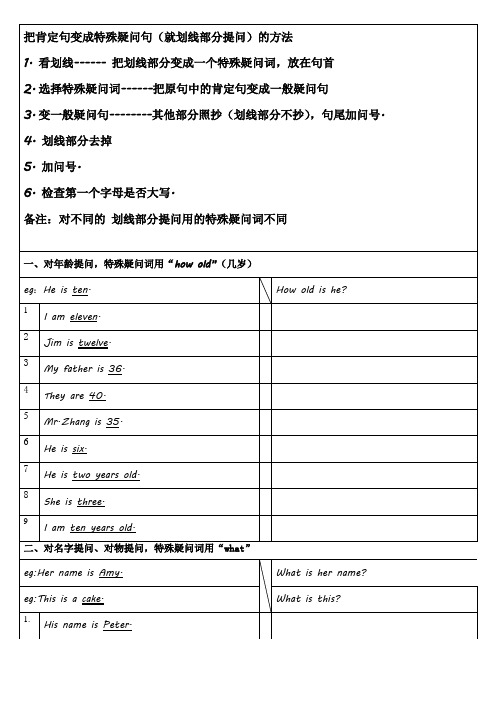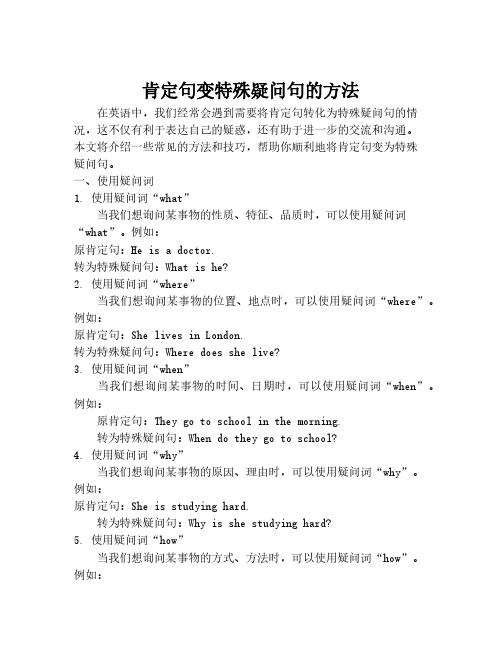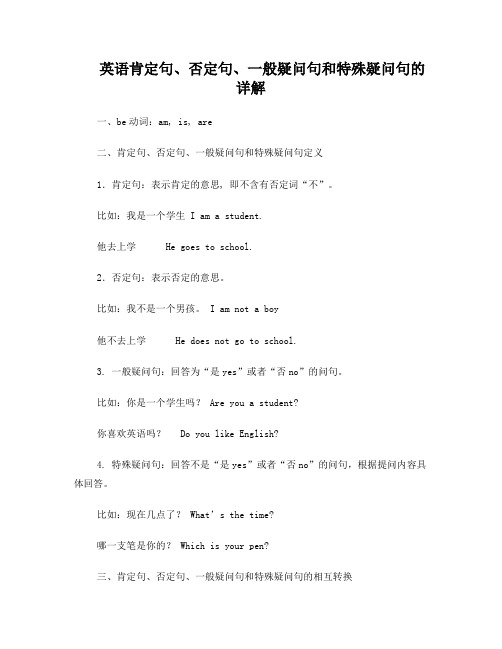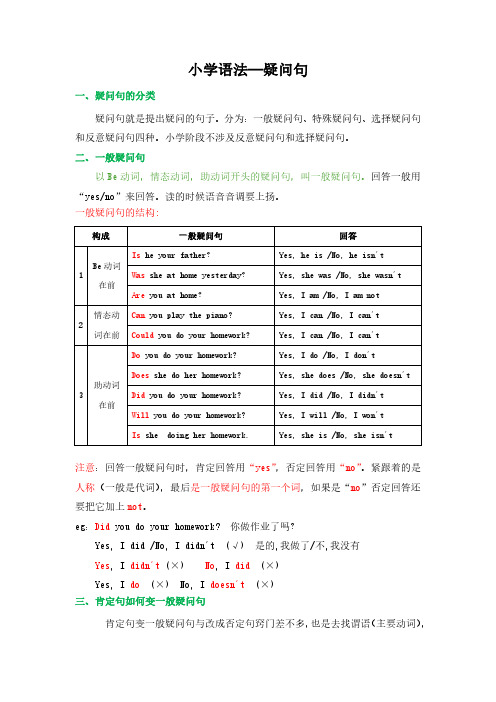肯定句变特殊疑问句练习和语法
把肯定句变成特殊疑问句

1
Thatis a pink clock.
2.
Thoseare the letters.
3.
Theseare picture.
八、对可数名词前的数量词提问,特殊疑问词用“how many”
eg:There isachair in the room.
How many chairs are there in the room?
3.
The girlis Jim’s sister.
4.
The children areclassmater.
5
The boyis my brother
六、对颜色提问,特殊疑问用“what colour”
1
2
3
4
5
七、对this that these those提问,特殊疑问词用“which”
egThisis the letter Bb.
1.
I’ve gottworulers.
2.
There arethreepens in my bag..
3.
There aresomepeaes on the table.
4.
We’ve gotfourbooks.
5.
I can seefivekites.
九、对不可数名词前的数量词提问,特殊疑问词用“how much”
3.
My pencil isin my bag.
4.
They’rein the car.
5.
The giraffe isbehind the tree.
五、对人提问,特殊疑问词用“who”
eg:That is Mr.Zhang.
肯定句变特殊疑问句的方法

肯定句变特殊疑问句的方法在英语中,我们经常会遇到需要将肯定句转化为特殊疑问句的情况,这不仅有利于表达自己的疑惑,还有助于进一步的交流和沟通。
本文将介绍一些常见的方法和技巧,帮助你顺利地将肯定句变为特殊疑问句。
一、使用疑问词1. 使用疑问词“what”当我们想询问某事物的性质、特征、品质时,可以使用疑问词“what”。
例如:原肯定句:He is a doctor.转为特殊疑问句:What is he?2. 使用疑问词“where”当我们想询问某事物的位置、地点时,可以使用疑问词“where”。
例如:原肯定句:She lives in London.转为特殊疑问句:Where does she live?3. 使用疑问词“when”当我们想询问某事物的时间、日期时,可以使用疑问词“when”。
例如:原肯定句:They go to school in the morning.转为特殊疑问句:When do they go to school?4. 使用疑问词“why”当我们想询问某事物的原因、理由时,可以使用疑问词“why”。
例如:原肯定句:She is studying hard.转为特殊疑问句:Why is she studying hard?5. 使用疑问词“how”当我们想询问某事物的方式、方法时,可以使用疑问词“how”。
例如:原肯定句:He solved the problem.转为特殊疑问句:How did he solve the problem?二、将助动词提前在一些情况下,我们可以通过将助动词提前来将肯定句变为特殊疑问句。
例如:原肯定句:She can speak French.转为特殊疑问句:Can she speak French?三、使用陈述句语序当我们将肯定句变为特殊疑问句时,可以直接使用陈述句的语序,即主语+谓语+其他成分。
例如:原肯定句:They have finished their homework.转为特殊疑问句:Have they finished their homework?四、加入特殊疑问词和助动词有时候,我们需要在特殊疑问句中加入特殊疑问词和助动词,以满足语法结构的要求。
(完整版)肯定句变特殊疑问句练习和语法.doc

特殊疑问句肯定句变特殊疑问句(就划线部分提问):分 3 步骤第一步:先变一般疑问句第二步:找合适的特殊疑问词代替划线部分第三步:特殊疑问词提前放到句首,并大写,其余按顺序照抄,省略划线部分。
注意: 1.一定先变一般疑问句。
但是,如果问的是主语或主语的定语时,语序不变,为" 特殊疑问词 (+主语 )+陈述句 "。
2.划线部分不能在特殊疑问句中出现。
非单三时用do, 单三时用does非单三肯定句:I like English.一般疑问句:Do you like English?否定句: I do not like English.单三肯定句: He likes English.一般疑问句:Does he like English?否定句: He does not like English.就划线部分提问:I like English.第一步:先变一般疑问句Do you like English?第二步:找合适的特殊疑问词代替划线部分Do you like what?第三步:特殊疑问词提前放到句首,并大写,其余按顺序照抄,省略划线部分。
What do you like?小学英语对划线部分提问答题口诀:一代(用疑问词代替划线部分),二移(把疑问词移至句首),三找(找 is , are ,can,would)抄在疑问词后,没有则用do,does( 用于主语是第三人称 ) ,出现 I am 则直接改为 Are you ),四抄(照抄其它部分)五改(出现 some,要考虑是否改为 any。
出现 I改为you,出现we改为you ,出现 my 改为 your, 出现 our 改为 your 。
最后是加问号)特殊疑问句有两种语序:(可以不掌握 )(1)如疑问词作主语或主语的定语,即对主语或主语的定语提问,其语序是陈述句的语序:疑问词(+主语)+谓语动词+其他成分例: who is singing in the room﹖whose bike is broken﹖(2)如疑问词作其他成分,即对其他成分提问,其语序是:疑问词+一般疑问句语序?例: what class are you in﹖特殊:1.some 变为 any。
英语句型转换(一般一问句转特殊疑问句)

★必备知识点:1.be动词:am、is、are、was、were;小学阶段,be动词后只接名词,形容词或动词的ing形式。
2.助动词:do、does、did、have、had;助动词后的动词用原形。
3.情态动词can、must、will、may、need等;情态动词+动词原形一、肯定句、否定句定义1.肯定句:表示肯定的意思, 即不含有否定词“不”。
例:我是一个学生I am a student. 他去上学He goes to school.2.否定句:表示否定的意思。
例:我不是一个男孩。
I am not a boy 他不去上学He does not go to school.二、一般疑问句(一)、什么是一般疑问句用Yes或No作答的疑问句叫一般疑问句。
一般疑问句还有下列特点:1、以be动词、助动词或情态动词开头;例:Is your father a teacher? Does Catherine like animals?Can Jenny speak French?2、往往读升调;3、译成汉语,都可以带上“吗”,例如上面三句可分别译为:你父亲是老师吗?凯瑟琳喜欢动物吗?詹妮会说法语吗?★(二)、如何将陈述句变成一般疑问句?要将陈述句变成一般疑问句,可以遵循下列步骤:1.看句中有没有be动词(am、is、are、was、were)、助动词(do、does、did、have、had)或情态动词(can、must、will、may等),如果有,将其提到句首,句末打上问号即可。
例:It was rainy yesterday. →Was it rainy yesterday?T om's father can play the piano. →Can Tom's father play the piano?I have finished my homework.→Have you finished your homework?2.如果句中没有be动词、助动词或情态动词,则根据谓语动词的形式借助do的相应形式放在句首。
小学英语语法肯定句变一般疑问句、特殊疑问句的练习题

肯定句变疑问句-能力测试一、将下列问句做出简单回答。
1.Is he tall?2.Is she at home?Yes,____________.No,_____________.Yes,____________.No,_____________.3.Are you busy these days?4.Can you make the bed at home?Yes,____________.No,_____________.Yes,____________.No,_____________.5.Did Lucy go to the zoo yesterday?6.Was your father a teacher?Yes,____________.No,_____________.Yes,____________.No,_____________.7.Were you at the meeting last week?8.Will she have a meeting tomorrow?Yes,____________.No,_____________.Yes,____________.No,_____________.9.Do you do your homework?10.Does she water the flowers?Yes,____________.No,_____________.Yes,____________.No,_____________.二、将下列句子改成一般疑问句。
1.My brother often goes shopping._________________________________________________________________2.I finished school two years ago._________________________________________________________________3.They go to Beijing by plane._________________________________________________________________4.He has a brother and a sister._________________________________________________________________5.It is an apple._________________________________________________________________6.There is some water in the bottle._________________________________________________________________7.I visited my aunt last holiday._________________________________________________________________8.My sister studied hard last night._________________________________________________________________9.There is some milk in the cup._________________________________________________________________10.I know his telephone number._________________________________________________________________11.I get up at six thirty every day._________________________________________________________________12.They can play football after school._________________________________________________________________13.I’m a student._________________________________________________________________三、对下列句子的划线部分提问。
句型转换和特殊疑问句的语法

句型转换和特殊疑问句的语法肯定句、否定句、一般疑问句的相互转换一、含有的be动词、助动词和情态动词的句子;一律在be动词、助动词和情态动词后加“not”,改为一般疑问句时,一律将be动词、助动词和情态动前移到句首(首字母大写)。
肯定回答用“Yes”;否定回答用“No”。
“Yes”或“No”后面的主语必须用代词,“No”后面必须用否定缩略式。
1. There are some computers in this school. (be动词)There aren’t any computers in this school.Are there any computers in this school? (Y es, there are. / No, there aren't.)2. Li Ming’s father can drive the car. (情态动词)Li Ming’s father can’t drive the car.Can Li Ming’s father drive the car? (Yes, he can. / No, he can’t.)3. She has already finished his homework now. (助动词)She hasn’t finished his homework yet.Has she finished his homework yet? (Y es, she has. / No, she hasn’t.)二、只有行为动词的句子。
必须借助助动词do; does; did。
改为否定句,在行为动词前加don’t(一般现在时态,主语是除第三人称单数之外的人称和数时);doesn’t(一般现在时态,主语是第三人称单数时);didn’t(一般过去时态)。
改为一般疑问句时,在句首加Do;Does 或Did。
肯定回答用“Yes”,后面动词用 do; does或did”;否定回答用“No”,后面动词用don’t (doesn’t; didn’t)”。
小学英语一般疑问句和特殊疑问句(附练习题)

英语肯定句、否定句、一般疑问句和特殊疑问句的详解一、be动词:am, is, are二、肯定句、否定句、一般疑问句和特殊疑问句定义1.肯定句:表示肯定的意思, 即不含有否定词“不”。
比如:我是一个学生 I am a student.他去上学 He goes to school.2.否定句:表示否定的意思。
比如:我不是一个男孩。
I am not a boy他不去上学 He does not go to school.3. 一般疑问句:回答为“是yes”或者“否no”的问句。
比如:你是一个学生吗? Are you a student?你喜欢英语吗? Do you like English?4. 特殊疑问句:回答不是“是yes”或者“否no”的问句,根据提问内容具体回答。
比如:现在几点了?What’s the time?哪一支笔是你的? Which is your pen?三、肯定句、否定句、一般疑问句和特殊疑问句的相互转换有am, is, are的句子,肯定句变否定句:在am, is, are后面加上not,其余按顺序照抄。
肯定句变一般疑问句:把am, is, are提前放到句首并大写Am, Is, Are,其余照抄。
肯定句变特殊疑问句(就划线部分提问):分3步骤第一步:先变一般疑问句第二步:找合适的特殊疑问词代替划线部分第三步:特殊疑问词提前放到句首,并大写,其余按顺序照抄,省略划线部分。
注意:1.一定先变一般疑问句。
但是,如果问的是主语或主语的定语时,语序不变,为"特殊疑问词(+主语)+陈述句"。
如:Li ming 's not here today. Who's not here today? 今天谁没来?2.划线部分不能在特殊疑问句中出现。
when 什么时间(问时间)what date 什么日期问具体日期who 谁(问人)what place什么地点问具体地址whose 谁的问主人how …怎么样问情况where 在哪里问地点how old 多大问年龄which 哪一个问选择how many 多少问数量例如:1.肯定句、否定句和一般疑问句的互换肯定句:This is a book.否定句:This is not a book.一般疑问句:Is this a book?肯定回答:Yes, it is.否定回答:No, it isn’t.2.就划线部分提问(变特殊疑问句)This is a book.第一步:变一般疑问句 Is this a book?第二步:找合适的特殊疑问词 Is this what ?第三步:特殊疑问词提前放到句首,并大写,其余按顺序照抄,省略划线部分。
最新小学英语语法肯定句变一般疑问句、特殊疑问句的用法归纳总结

小学语法—疑问句一、疑问句的分类疑问句就是提出疑问的句子。
分为:一般疑问句、特殊疑问句、选择疑问句和反意疑问句四种。
小学阶段不涉及反意疑问句和选择疑问句。
二、一般疑问句以Be动词,情态动词,助动词开头的疑问句,叫一般疑问句。
回答一般用“yes/no”来回答。
读的时候语音音调要上扬。
一般疑问句的结构:构成一般疑问句回答1Be动词在前Is he your father?Yes,he is/No,he isn´t Was she at home yesterday?Yes,she was/No,she wasn´t Are you at home?Yes,I am/No,I am not2情态动词在前Can you play the piano?Yes,I can/No,I can´t Could you do your homework?Yes,I can/No,I can´t3助动词在前Do you do your homework?Yes,I do/No,I don´tDoes she do her homework?Yes,she does/No,she doesn´t Did you do your homework?Yes,I did/No,I didn´tWill you do your homework?Yes,I will/No,I won´tIs she doing her homework.Yes,she is/No,she isn´t注意:回答一般疑问句时,肯定回答用“yes”,否定回答用“no”。
紧跟着的是人称(一般是代词),最后是一般疑问句的第一个词,如果是“no”否定回答还要把它加上not。
eg:Did you do your homework?你做作业了吗?Yes,I did/No,I didn´t(√)是的,我做了/不,我没有Yes,I didn´t(×)No,I did(×)Yes,I do(×)No,I doesn´t(×)三、肯定句如何变一般疑问句肯定句变一般疑问句与改成否定句窍门差不多,也是去找谓语(主要动词),再变化,遇到some要变成any。
- 1、下载文档前请自行甄别文档内容的完整性,平台不提供额外的编辑、内容补充、找答案等附加服务。
- 2、"仅部分预览"的文档,不可在线预览部分如存在完整性等问题,可反馈申请退款(可完整预览的文档不适用该条件!)。
- 3、如文档侵犯您的权益,请联系客服反馈,我们会尽快为您处理(人工客服工作时间:9:00-18:30)。
特殊疑问句
肯定句变特殊疑问句(就划线部分提问):分3步骤
第一步:先变一般疑问句
第二步:找合适的特殊疑问词代替划线部分
第三步:特殊疑问词提前放到句首,并大写,其余按顺序照抄,省略划线部分。
注意:1.
2.划线部分不能在特殊疑问句中出现。
非单三时用do, 单三时用does
非单三肯定句:I like English.
否定句:
单三肯定句:He likes English.
like English?
否定句:like English.
就划线部分提问:I like English.
第一步:先变一般疑问句 Do you like English?
第二步:找合适的特殊疑问词代替划线部分Do you like what?
第三步:特殊疑问词提前放到句首,并大写,其余按顺序照抄,省略划线部分。
What do you like?
小学英语对划线部分提问答题口诀:
一代(用疑问词代替划线部分),
二移(把疑问词移至句首),
三找(找is , are ,can,would)抄在疑问词后,没有则用do,does(用于主语是第三人称),出现I am 则直接改为Are you),
四抄(照抄其它部分)
五改(出现some,要考虑是否改为any。
出现I 改为 you, 出现 we 改为 you ,出现my 改为your,出现our改为your。
最后是加问号)
特殊疑问句有两种语序:(可以不掌握)
(1)如疑问词作主语或主语的定语,即对主语或主语的定语提问,其
语序是陈述句的语序:疑问词(+主语)+谓语动词+其他成分
例:who is singing in the room﹖
whose bike is broken﹖
(2)如疑问词作其他成分,即对其他成分提问,其语序是:疑问词+
一般疑问句语序?
例:what class are you in﹖
特殊:
1.some变为any。
如:
There are some birds in the tree.→There aren't any birds in the tree.
但是,若在表示请邀请、请求的句子中,some可以不变。
如:
Would you like some orange juice?
与此相关的一些不定代词如something, somebody等也要进行相应变化。
2.and变为or。
如:
I have a knife and a ruler.→I don't have a knife or a ruler.
3.a lot of (=lots of)变为many或much。
如:
They have a lot of friends.(可数名词)→They don't have many friends.
There is lots of orange in the bottle.(不可数名词)
→There isn't muc h orange in the bottle.
4.already变为yet。
如:
I have been there already.→I haven't been there yet.
总结一条就是:“特殊疑问词+一般疑问句”,但特殊疑问词的确定要根据划线内容确定,在小学阶段常出现的有以下几种:
1.划线部分是“事或物”,特殊疑问词用what
Eg: This is a bag. ---What is this?
We often play football on Sundays . ---What do you often do on Sundays ?
2、划线部分是“职业”,特殊疑问词用what
Eg:Tom is a worker. ---What is Tom?/What do you do ?
3、划线部分是“时间”,特殊疑问词用what time或when
Eg: It's six thirty . ---What time is it ?
I usually get up at six forty . --- When do you usually get up?
4、划线部分是“人”,特殊疑问词用who
Eg: She is my sister. ---Who is she ?
5、划线部分是“地点”,特殊疑问词用where
Eg: The apple is on the desk. ---Where is the apple ?
6、划线部分是“年龄”,特殊疑问词用how old
Eg:I am twelve . ---How old are you?
My mother is thirty- two . ---How old is your mother ?
7、划线部分是“颜色”,特殊疑问词用what colour
Eg:My hat is blue . ---What colour is your hat?
8、划线部分是“数量”,特殊疑问词用how many或how much
Eg: I can see five birds in the tree.---How many birds can you see ?
There is some tea in the cup. ---How much tea is there in the cup ?
9、划线部分是“多少钱”,特殊疑问词用how much
Eg: This book is ten yuan . ---How much is this book ?
10、划线部分是“形容词性物主代词或名词性物主代词”,特殊疑问词用whose
Eg: That is my shirt . ---Whose shirt is that ?
I.对画线部分提问
1.They buy a new bike.
____________________________________________________
2.She is a nurse .
____________________________________________________
3.She is my teacher.
____________________________________________________
4.He wants to visit Beijing.
____________________________________________________
5.It is my coat .
____________________________________________________
6.I am looking for my sister .
____________________________________________________
7.I get up at six .
____________________________________________________
8.I am from Hubei .
____________________________________________________
9.I go to school late because I get up late.
____________________________________________________
10. It is windy .
_____________________________________________________
11. I am getting on well with it.
_____________________________________________________
12. My bag is red .
______________________________________________________
13. The book is Li Hua’s.
______________________________________________________ 14. I like math best.
______________________________________________________ 15. They are five yuan .
______________________________________________________ 16. I wash it twice a week .
______________________________________________________ 17. He will be back in four days .
______________________________________________________ 18. I don’t come to class because I am sick .
______________________________________________________。
